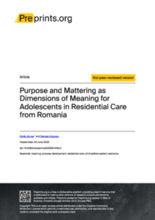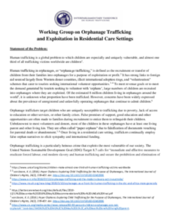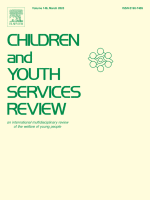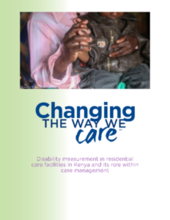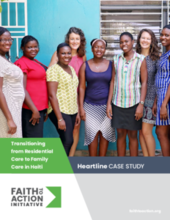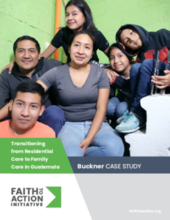Displaying 71 - 80 of 1510
The study follows the interaction between the individual and the social context regarding the development of adolescents protected in residential houses from the child protection system in Iasi County, Romania.
This statement was released by the Working Group on Orphanage Trafficking and Exploitation -- a global coalition of Members of Parliament, government leaders, survivor leaders, and key stakeholders committed to combatting orphanage trafficking and the exploitation through raising awareness and identifying, creating, and implementing tools that curb the demand for orphanage trafficking and stop the exploitation of children in residential care settings, including orphanages. The Working group aims to raise awareness and combat orphanage trafficking at the policy level globally.
This study analyzes the sequential relationships between exposure to adverse childhood experiences, trauma-related symptoms, psychological maladjustment, and the perception of group climate and peer interactions for those in out-of-home placements in Spain.
This US-based study examined youth’s perspective of the quality of care and experiences in residential group care. This study was approved by an Institutional Review Board. Data were collected as part of a larger statewide pilot of the Quality Standards Assessment (QSA).
Though research has been conducted on children with disabilities and on children in residential care settings, the intersections of these two topics has yet to be explored in depth. Notably, there is a lack of information surrounding disability measurement within residential care settings, highlighting a gap in the literature. It is estimated that a child with a disability is 17 times more likely to be placed in an institutionalized care setting than a child without a disability, and girls are more likely to be placed in an institution than boys. This report details research conducted in Kenya.
This webinar provided an opportunity for the care community to share experiences on the transformation of residential care.
The story of Heartline’s transition from residential care to family care is told in this recently released Faith to Action case study. The case study details their experience through three stages of transition—learning, preparation and planning, and full transition—with transparency. It addresses common challenges for transitioning organizations, as well as the strategies Heartline took to overcome them.
The story of Buckner Guatemala’s transition from residential care to family care is told in this recently released Faith to Action case study. The case study details their experience through three stages of transition—learning, preparation and planning, and full transition—with transparency. It addresses common challenges for transitioning organizations, as well as the strategies Buckner took to overcome them.
This Children and Youth Services Review study performed a systematic review of research on training programs aiming the fostering of emotional and mental health in residential youth care. A systematic search was conducted in nine digital databases and other sources (websites, relevant journals, reference lists of included articles and relevant reviews), for publications from 1980 to 2021.
After 60 years of serving as a residential institution for children with disabilities, the Hîncești Auxiliary Boarding school (SIA Hîncești) in Moldova closed its doors to children in May 2022. The closing of Hîncești SIA serves as a harbinger for what is possible for other institutions for children with disabilities in Moldova and around the world.

